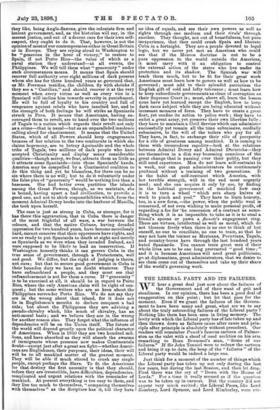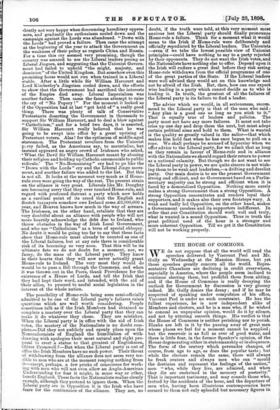THE LIBERAL PARTY AND ITS FAILURES.
WE hear a great deal just now about the failures of the Government and of their want of grit and steadiness. In our opinion, there has been a good deal of exaggeration on this point ; but let that pass for the moment. Even if we grant the failures of the Govern- ment to have been many and great, what are we to say about the truly astounding failures of the Liberal party ? Nothing like them has been seen in living memory. The levity with which the Liberal party has of late taken up and then thrown down as failures cause after cause and prin. ciple after principle is absolutely without precedent. Our readers will remember Punch's famous cartoon of Palmer- ston as the valet with a sheaf of used neckties on his arm remarking to Beau Brummel's man, "Some of our failures." If Sir John Tenniel were to redraw the cartoon and bring it up to date, the heap of the " failures " of the Liberal party would be indeed a large one.
Just think for a moment of the number of things which the Liberal party has taken up not only during the last few years, but during the last Session, and then let drop. First there was the cry of "Down with the House of Lords." For a time it really seemed as if the question was to be taken up in earnest. But the country did not appear very much excited ; the Liberal Peers, like Lord Rosebery, Lord Spencer, and Lord Kimberley, were evi- dently not very happy when denouncing hereditary oppres- sors, and gradually the enthusiasm cooled down and the ,campaign against the Lords was abandoned. "Down with the Lords" had proved a failure. Then came the attempt at the beginning of the year to attack the Government on the weakness of their policy as regards China and Russia. For a time this cry seemed very promising, though the -country was amazed to see the Liberal leaders posing as Liberal Jingoes, and suggesting that the Unionist Govern- ment had failed to uphold "the might, majesty, and dominion" of the United Kingdom. But somehow even this promising horse would not run when trained in a Liberal stable. After a little while Sir William Harcourt and Lord Kitnberley's Jingoism cooled down, and the efforts to show that the Government had sacrificed the interests of the Empire died away. Liberal Imperialism was another failure. Then came the famous attempt to raise the cry of "No Popery !" For the moment it looked as if the Opposition had at last "got hold of" a really good thing. There was plenty of talk of Conservative Protestants deserting the Government in thousands to support Sir William Harcourt, and to deal a blow against " Catholicism," and for a brief two days, it is asserted, Sir William Harcourt really believed that he was going to be swept into office by a great uprising of Protestant voters. Alas ! for the optimism of middle-aged statesmen. The Protestant revolters from the Unionist p..rty failed, as the Americans say, to materialise, but instead appeared an angry crowd of Irishmen who asked, What the Devil Sir William Harcourt meant by abusing their religion and holding up Catholic ceremonials to public ridicule.' The "No-Romanising" cry had to go like the " Down with the Lords" cry and the Liberal Jingo move- ment, and another failure was added to the list. But this is not all. It looks at the moment very much as if Home- rule even were going the way of the rest. The present strain -on the alliance is very great. Liberals like Mr. Doughty are becoming sorry that they ever touched Home-rule, and regard with profound distrust a party which now holds as a cardinal point of its creed that the English and Scotch taxpayers somehow owe Ireland some £3,000,000 a year, and Heaven knows how much in the way of arrears. The Irishmen, on the other hand, retaliate that they are very doubtful about an alliance with people who will not more heartily acknowledge the debt due to Ireland, who throw obstacles in the way of Irish Local Government, and who use "Catholicism" as a term of special obloquy. No doubt it would be going too far to say that these facts show that Home-rule must already be counted as one of -the Liberal failures, but at any rate there is considerable risk of its becoming so very soon. That this will be its ultimate fate we do not doubt for a moment, nor, we fancy, do the mass of the Liberal party. They know in their hearts that they will now never actually grant Home-rule to Ireland. The very most they would do would be to pass a Bill through the Commons, and when it was thrown out in the Peers, thank Providence for the existence of a House of Lords, and tell the Irish that they had kept their word, and intended, with the aid of their allies, to proceed to useful social legislation in the interest of the whole nation.
The possibility of Home-rule being soon semi-officially admitted to be one of the Liberal party's failures raises questions which are well worth considering. People sometimes talk as if the Irish Members had obtained so complete a mastery over the Liberal party that they can make it do whatever they chose. They are mistaken. When the Liberal party is in office with the aid of Irish votes, the mastery of the Nationalists is no doubt coin- plete.—Did they not publicly and openly place upon the Nonconformists of England the humiliation of with- drawing with apologies their most natural and right pro- posal to erect a statue to that greatest of Englishmen, Oliver Cromwell ?—But when the Liberal party is out of office the Irish Members have no such power. Their threat of withdrawing from the alliance does not seem very ter- rible to men who are at the moment reaping nothing from it—except, perhaps, a few pricks of conscience for work- ing with men who will not even allow an Anglo-American Understanding for fear it might, in some way or other, benefit England. These facts the Nationalists realise clearly enough, although they pretend to ignore them. When the Liberal party are in Opposition it is the Irish who have fears for the continuance of the alliance. They are, no doubt, if the truth were told, at this very moment most anxious lest the Liberal party should finally pronounce Home-rule a failure. Think for a moment what it would mean to the Irish if Home-rule were deliberately and officially repudiated by the Liberal leaders. The Unionists —even if we take the lowest possible view of Unionist principles—could have nothing to say to a party rejected by their opponents. They do not want the Irish votes, and the Nationalists have nothing else to offer. Depend upon it the Irish will endure a great deal before they risk seeing Home-rule withdrawn from the official programme of one of the great parties of the State. If the Liberal leaders were well advised they would act on this knowledge and not be afraid of the Irish. But, then, how can one expect wise leading in a party which cannot decide as to who is leading it. In truth, the greatest of all the failures of the Liberal party is its failure to find a leader.
The advice which we would, in all seriousness, recom- mend to the Liberal party is that of the man who said: "Any plan is a good one as long as you stick to it." That is equally true of leaders and policies. The party must not have any more failures. It must not take cries up one day and drop them the next, but must adopt certain political aims and hold to them. What is wanted is the quality so greatly valued in the sailor—that which makes him hold fast when he has once begun to pull on a rope. We shall perhaps be accused of hypocrisy when we offer advice to the Liberal party, for we admit that as long as they remain in favour of Home-rule and in alliance with the Nationalists we should regard their return to power as a national calamity. But though we do not want to see the Liberal party in power, we are quite sincere in not wish- ing them to be weak and leaderless,—a drifting and derelict party. Our main desire is to see the present Government strong and efficient, and no Government based on a Parlia- mentary majority can be strong and efficient when it is faced by a demoralised Opposition. Nothing more surely makes a strong Government than a strong Opposition. A strong Opposition concentrates and renders loyal their supporters, and it makes also their own footsteps wary. A weak and badly led Opposition, on the other hand, makes a Government careless and its supporters indifferent. In order that our Constitution should work well and truly, what is wanted is a sound Opposition. Thus in truth the great political need of the hour is a stronger and more coherent Opposition. Till we get it the Constitution will not be working properly.



































 Previous page
Previous page